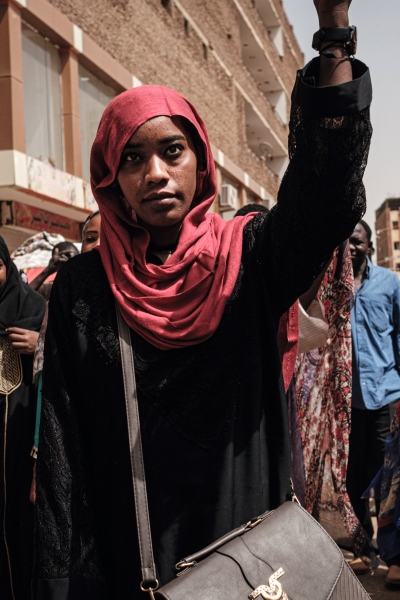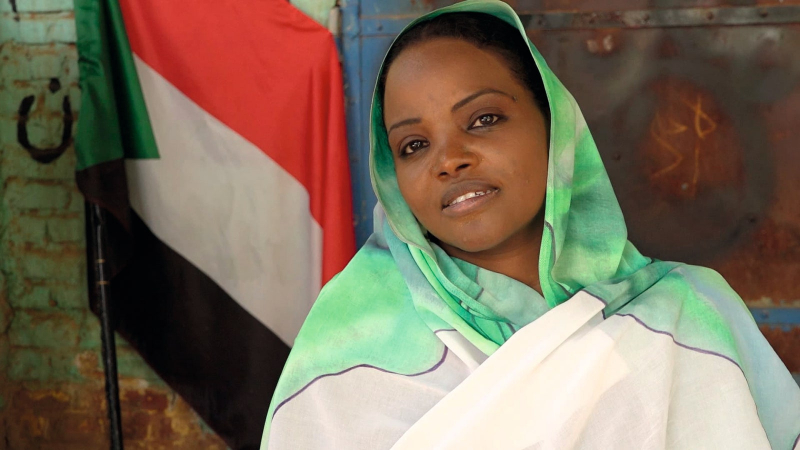
Whenever the bombs would go off nearby, Sulaima Ishaq Elkhalifa would gather her four children, sister, husband and mother into one room of her house to recite the Koran and try to stave off her nightmare visions of their casualties. The day they almost became a reality, the whole house shook against her family’s screams. “We smelled the dust,” she describes over a shaky phone line from Kosti, Sudan. “There was so much dust.”
Sudan has experienced three multi-decade domestic wars since it achieved independence in 1956, all of which have taken place in its marginalised regions. Elkhalifa never expected another to break out in its capital, Khartoum. But when, in April this year, it did, the simmering tensions between the Sudanese Armed Forces and Rapid Support Forces (RSF) having reached a boiling point, she thought it would last a few hours, then a few days. When it intensified – the sounds of war echoing in her Omdurman home – and people around her prepared passports for Egypt, she thought they were overreacting. Even as she fled to Kosti, a city south of Khartoum, the day after the bomb fell next to her home, she didn’t take everything: “I thought, I’m going back in a few weeks. Maybe things will change.”
Elkhalifa can’t help but hope for the best, but as a human rights defender who has lived in Darfur conflict zones, she knows a return to normality will not be simple. And as general director of Sudan’s Unit for Combating Violence Against Women, so too does she know just how horrifically this conflict will affect women. It already has.
As she fled, Elkhalifa called the minister for social development: “It’s going to be an emergency for women,” was her message. At shelters and associations around Kosti, Elkhalifa set about training 57 volunteers on psychological first aid (a World Health Organization-endorsed disaster intervention that involves compassionate listening and providing coping strategies) while privately praying that “the worst” would not happen. But a few days later, she got a call: in Khartoum some Ethiopian girls had been raped.
“Every day, things got much worse,” Elkhalifa recalls. Echoing the atrocities of the 2003 Darfur genocide, “Most of [the sexual violence victims] are very young girls in Darfur and Bahri.” A colleague reported 25 cases of rape in Darfur by the RSF, before she had to flee to South Sudan when her own home was looted. Meanwhile, in Khartoum, women are disappearing. They leave to get groceries and do not return. Men released from local detention centres run by the RSF report seeing women inside, but the RSF deny these claims, despite evidence to the contrary.
So far, in this new war, at the time of writing, 4,000 to more than 10,000 civilians are thought to have been killed, and more than three million have been displaced, but the numbers around sexual violence are harder to estimate. The UN reports that in conflict zones worldwide, for every victim that reports a further 10 or 20 go undocumented, meaning for the 2,455 UN-verified cases last year, an additional 24,550 to 49,100 went unreported.

In Sudan, survivors are “punished twice”, Dr Albaqir Mukhtar, a Sudanese civil leader and human rights scholar, says. “Once when raped and then by communities that do not embrace or provide help for them.” He explains that, “Men injured in the war are considered heroes, those who die are considered martyrs, but women that have been raped are not considered similarly to injured men. They are considered a shame brought on the family.” Shunned by family or husbands, some have committed suicide. And those who speak out are at risk: after Elkhalifa’s colleague’s report was shared with the UN, militiamen returned to search for her by name. With the conflict ongoing, very few step forward. “They still have the fear of the trauma on them… It’s full of violations for [reporting], threats. It’s not safe,” Elkhalifa says.
During the revolution in April 2019, before she stepped into her current position, Elkhalifa was a part of the sit-in surrounding the military headquarters in Khartoum that led to President Omar Al-Bashir’s deposition and arrest. Their demand was for a full civilian government with authority and they were willing to occupy the area for as long as it took to meet that demand. Tents and stages were erected and hundreds of thousands of people would be there at any one time. “There was so much hope within the sit-in,” Elkhalifa recalls.“You feel this kind of peace,” she says. “Then everything just crashed.”
She can still smell the unusual blend of coffee, perfume, cigarettes and yeast water – a salve for gas bombs – that filled the air on 3 June 2019, the day soldiers opened fire on protesters lying flat on the ground, killing at least 118 people. More than 70 people were raped. The man next to Elkhalifa was shot and she helped to lay him on the blanket she was carrying.“He was smiling even though he was so injured,” she remembers. “There was so much blood everywhere. Our eyes locked for a second and then he died.”
Elkhalifa did not actually want the civil service position she took five months later. The first time she got the call from the former minister of social development, “I said, ‘I cannot. I don’t want to be in the government.’” When they stressed that few others would come forward, she felt guilty. As they were led by a civilian prime minister, she agreed to take the post temporarily, but then “the government changed, there was a coup, and I was trapped”.
At one point, when a UN adviser mentioned in a report that Sudan’s government entity was working with them, Elkhalifa came under investigation for allegedly “spying on the state, violating the constitutions – all allegations would get me to the death sentence,” she says. “I told them that I’m just doing my job… and actually, I don’t need to go to the government to give information, I am the government – they need to get information from me. I am the person that is supposed to have the institutional responsibility.” In the summer of 2022, she was interrogated and briefly arrested before being released on bail the same day. The experience made her decide to stay. “If I resign, they will say I was lying and left because I fear them. I’m staying and siding with women and girls of Sudan.”
Still, she seeks to use her position and platform to create change from within. As she sees it, “Apart from the generals’ war, we have our own war to end sexual violence in conflict.” Elkhalifa seeks to push for the recognition and empowerment of women post-war to help more of them to become self-reliant. This includes “getting them appropriate technologies so that they can produce and have their own money”. That helps everyone, she notes. “Most of the rehabilitation, the normalising and [bringing] people back to their lives will be shouldered by women and girls. This is the role of women all the time, through history. We need this kind of empowerment.”



